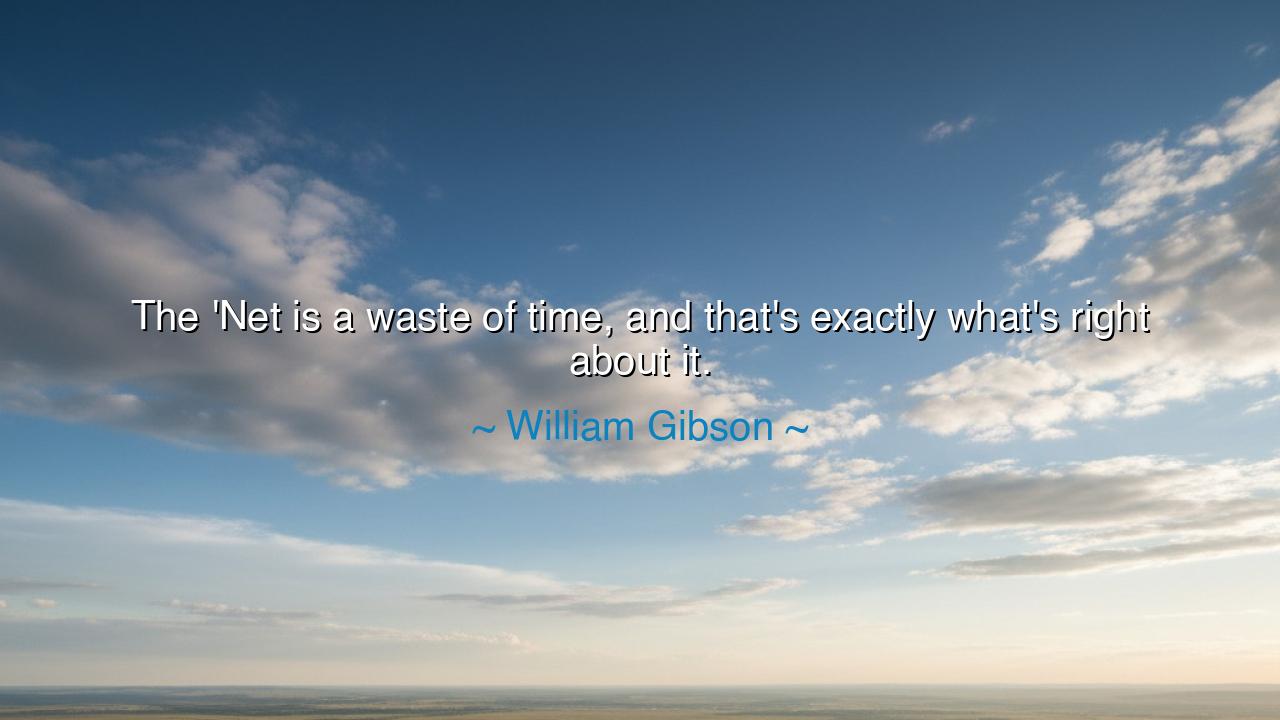
The 'Net is a waste of time, and that's exactly what's right






Hear the paradoxical yet piercing words of William Gibson, prophet of cyberspace and architect of visions yet unborn: “The ‘Net is a waste of time, and that’s exactly what’s right about it.” At first these words strike as irony, as a jest flung into the air. Yet beneath the laughter lies a deep river of truth. For Gibson, who first dreamed the word cyberspace into being, knew that the soul of the Internet was not in utility alone, but in its wandering, its meandering, its capacity to let the human spirit drift beyond the iron chains of productivity.
In ages past, men were bound to time as to a master. Every hour was counted, every labor weighed. Fields had to be plowed, goods traded, walls raised. Leisure was rare, and only the privileged few could waste their time upon philosophy, poetry, or play. But the coming of the Net gave to all what was once the luxury of the few: the ability to wander, to explore without purpose, to stumble into strange corners of knowledge, art, and fellowship. What seems a waste in the language of commerce is, in truth, a garden of discovery in the language of the soul.
Consider the tale of ancient Athens, where men gathered in the agora not always to trade, but to converse, to debate, to waste time in dialogue. Out of these “wastes” of time were born democracy, philosophy, and theater. Socrates himself, who seemed to idlers like a gadfly, spent his days in endless talk, shaping questions that still guide us today. So too in the digital agora of the Internet: in its forums, chats, and endless diversions, wisdom sometimes springs unexpectedly, born from the soil of play and idleness.
The deeper meaning of Gibson’s words is that waste is not always waste. To step outside the rigid economy of efficiency is to rediscover what it means to be human. The Internet, in its chaos, allows for wandering imagination, for friendships across oceans, for art shared in secret corners, for communities that could never have existed otherwise. What looks like unproductivity is often the birthplace of new forms of creativity, rebellion, and solidarity. That is what Gibson calls “right about it.”
Yet there is also danger. For the same waste of time that liberates can also ensnare. Too much wandering can become distraction without depth, a forgetting of self in the flood of endless images and words. Gibson knew this too, for he was no naïve celebrant of technology; he saw its shadows as well as its lights. The challenge is not to avoid wasting time, but to waste it well—to allow aimless exploration to awaken the spirit, not to drown it.
The lesson for us is clear: do not measure every hour by profit. Do not let the chains of endless utility bind your imagination. Give yourself time to wander the Net as men once wandered gardens or marketplaces. But be mindful—seek the corners where joy, creativity, and connection lie. Waste time in ways that enrich your humanity, not in ways that hollow it out.
Therefore, beloved listener, take action. When you find yourself idling on the Internet, do not despise the moment. Let it be a time of discovery, a chance to encounter something strange, beautiful, or challenging. But also set boundaries, lest your wandering turn to aimless drift. Waste time with intention, if such a paradox can be embraced, and you will find in the so-called waste the very sparks of inspiration.
Thus the voice of William Gibson endures: “The ‘Net is a waste of time, and that’s exactly what’s right about it.” Let it remind you that not all value can be counted, not all wisdom is born of labor. Sometimes, in drifting without purpose, we stumble into the truths that labor alone could never find. Waste a little time, and you may find, in the cracks of leisure, the seeds of wonder.






AAdministratorAdministrator
Welcome, honored guests. Please leave a comment, we will respond soon